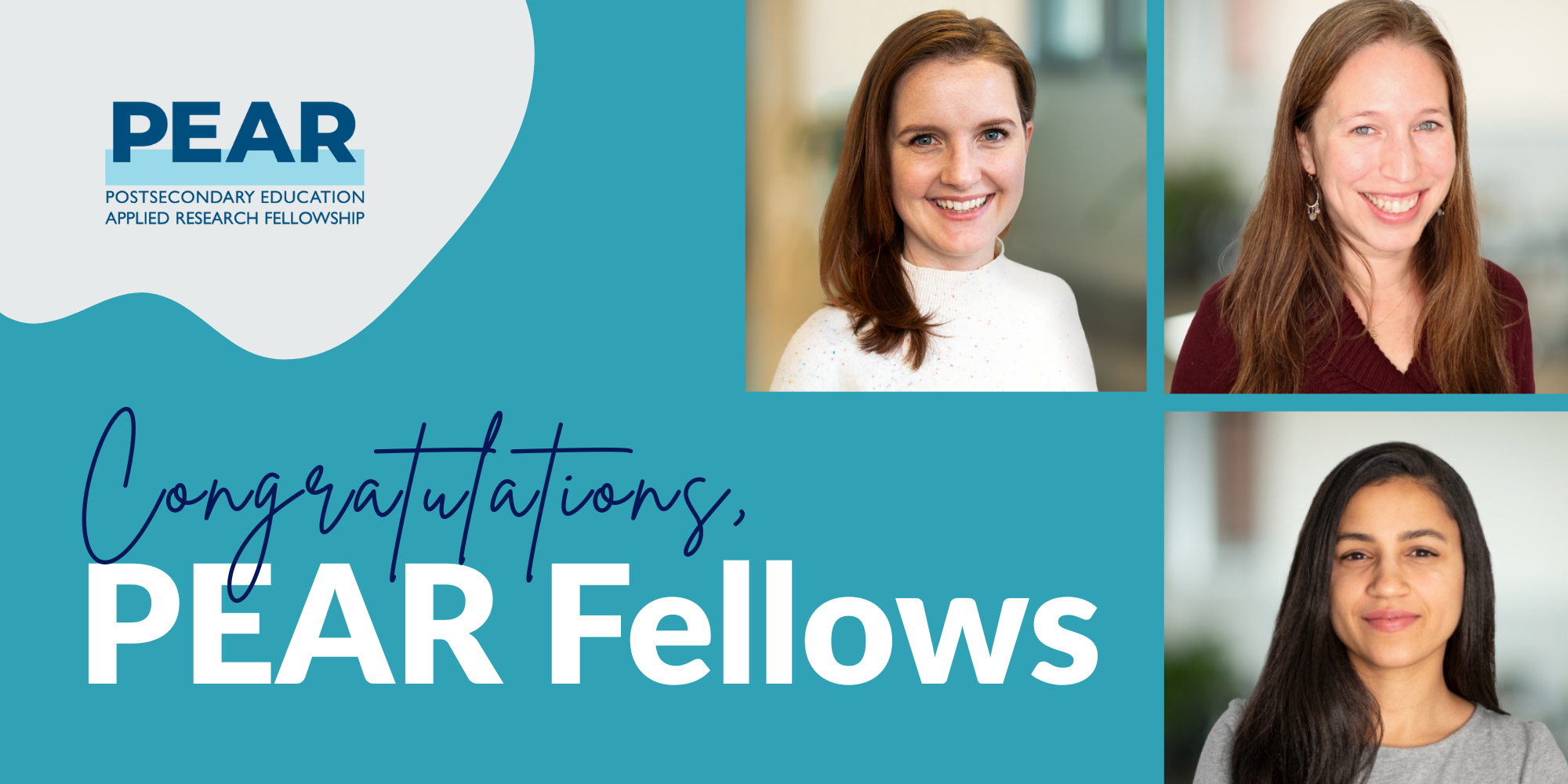The first group of PhD students being trained for careers in higher education research through the Postsecondary Education Applied Research (PEAR) Fellowship at Teachers College have been awarded Education Sciences Certificates, marking a major milestone along their path to a doctoral degree.
Astrid Pineda, Taylor Myers, and Melissa Herman completed the requirements of the fellowship and were awarded their certificates in June. They began in 2021 as part of the PEAR’s first cohort. Fifteen students in four cohorts are making their way through the program.
The PEAR Fellowship, funded by the U.S. Department of Education’s Institute of Education Sciences (IES) and Teachers College, provides doctoral students with training in advanced quantitative analysis and the practical skills needed for a career in applied research in postsecondary education. Administered jointly by CCRC and the Education Policy and Social Analysis (EPSA) department at Teachers College, the fellowship couples rigorous coursework with hands-on experience. It also provides fellows financial support during their doctoral training.
The certificate recognizes the completion of the PEAR Fellowship, indicating that fellows have satisfied all curriculum requirements, including defending their dissertation proposal and completing their research and practice/policy apprenticeships.
“I’m so proud of each of them, not only for the quality of work that they’ve done but also for the fact that the work they’re doing now addresses important issues and questions and makes a difference in policy and practice,” CCRC Director Thomas Brock said. “That really embodies the goals that we had for the PEAR Fellowship.”
Astrid Pineda completed her PhD in Economics and Education in fall 2025. Building on an interest in international education and causal analysis, Pineda completed her apprenticeship with the World Bank, where she was hired full time in January 2025 to conduct quantitative research on the intersection of economics and education.
“For a long time this had been my dream job,” Pineda said. “The fellowship gave me the opportunity to do this apprenticeship and it also gave me a lot of opportunities to present at conferences, to attend conferences, and to meet people. I’m super thankful for all the opportunities that came with completing this curriculum.”
Taylor Myers’ dissertation seeks to better understand the experiences of students aged 25 and older. She is exploring the effectiveness of interventions that target these students and ways to measure their progress after transferring from community colleges to four-year institutions. Myers is also conducting interviews with faculty and staff at four-year colleges to develop a better understanding of their perceptions of older students. She will defend her dissertation in mid-August.
Myers is currently the assistant director of research and policy at the Institute for Higher Education Policy in Washington, D.C., where she is looking into new race and ethnicity standards set by the U.S. Office of Management and Budget and their implications for major data systems. She is also examining how federal data are used to inform policy and practice and leads a research team that is putting together a case-making series to provide members of Congress and staffers on Capitol Hill with a clearer picture of what recent federal funding cuts mean for higher education.
While at CCRC, Myers contributed to projects focused on measuring colleges’ guided pathways adoption and refining indicators of successful transfer in STEM disciplines.
“This work taught me a great deal,” Myers said, “including how to work with linked administrative datasets, how critical credit transfer and articulation are to student progress, and the potential and limits of predictive modeling to inform policy.”
Melissa Herman, a PhD candidate in the Education and Policy program, completed an apprenticeship on a CCRC project examining first-generation students’ support systems. For her dissertation, Herman is working with the California Community College Chancellor’s Office to conduct research on the implementation of dual admission, a program that allows students to enroll simultaneously in a community college and at the University of California or California State University. The initiative is meant to address California’s challenges with transfer by providing students with additional support and resources to successfully make the transition from a two- to four-year college.
But implementing a new program isn’t always straightforward. Herman’s dissertation explores how dual admission is working on the ground and whether or not it benefits students from specific demographics, particularly first-generation students. She is coupling student and staff interviews with an analysis of administrative records to develop a better understanding of dual admission student outcomes.
“The PEAR Fellowship was so perfect for getting me connected with this dual admissions policy because now I’m getting to move from my apprenticeship into my dissertation,” Herman said. “And being able to study this policy using a mixed methods approach is really what I wanted to do from the very start: to bring qualitative and quantitative perspectives together.”
Congratulations to Astrid Pineda, Taylor Myers, and Melissa Herman from all of us at CCRC!




